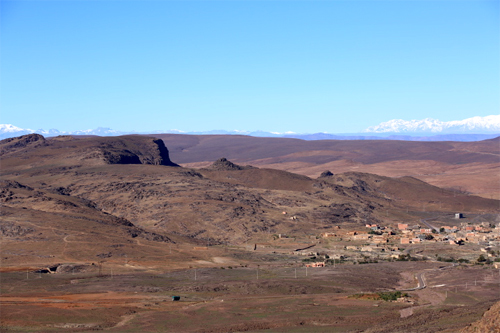World Music Central
by Daniel Brown
It is near the remote oasis of M’hamid El Ghizlane that the Taragalte festival opens this evening January 23. Once the desert gateway from which impressive commercial caravans set off southwards across the Sahara towards Timbuktu, this annual three-day event hopes to draw over 6,000 Moroccan and international participants. They join forces to celebrate a nomadic Amazigh culture that is being threatened by desertification, depopulation and a stagnant economy. WMC correspondent Daniel Brown sets the scene.
Acclaimed singers Aziz Sahmaoui and Oum top an enticing bill of music, debates, astronomy workshops, cinema, exhibitions and even a dromedary race. The January 23-25 gathering is set in the middle of spectacular dunes some seven kilometers from the Zagora province village of M’Hamid El Ghizlane. The sixth edition of the Taragalte festival has chosen the theme of “nomadic habitat,” summed up by the Berber word “khayma”. This black tent has been used for centuries by the Sahara Berbers for shelter as they embarked on a triangular odyssey over the Western Sahara in a trade involving slaves, dates, salt and gold. Taragalte, nowadays called M’Hamid El Ghizlane (« The Plains of Gazelles »), was a bustling hub of this triangle, an attractive town on the banks of Drâa river, home to over 20,000 people, including a community of 2,000 Jews. Nowadays, it has become a barren village of barely 3,000 people (15,000 if you include the outlying communities and nomadic groups that come through) where the original adobe buildings are often dilapidated. The population bravely survives thanks to a fragile tourist trade.
A ten-minute drive away from the village, in the midst of huge dunes and Biblical horizons, two brothers Ibrahim and Halim Sbaï, have once again set up a festival site to honor the region’s desert cultures. Since 2009, the duo has worked steadfastly to breathe new life into a province beleaguered by drought and the lure of Morocco’s major metropolises. Local traditional troupes and their dances called Chamra, Ahidous, Rokba and Ganga are to set the tone at the official opening with their fervent percussions and repetitive chants. The Sbaï brothers hope to honor and resuscitate an age-old traditional of moussems which brought together the region’s tribes and the local populations in important cultural exchanges based on music, popular verbal jousts, games and poetry.
The moussems had vital cohesive and economic roles within the Berber community that have all-but disappeared as a result of the rural exodus, an attraction towards Western culture and impoverishment. The Taragalte festival aims to revive the idea of a moussem gathering and sensitize Moroccans to the positive heritage of its Saharan culture. It also has been trying to make an environmental impact with workshops on the region’s ecosystem and tree-planting operations.
The 2015 edition will once again see a reaching-out operation towards two other major music gatherings, the Festival on the Niger (in Ségou, Mali) and Mali’s renowned Festival in the Desert. For a third consecutive year, the latter is condemned to a forced exile from its home in the Timbuktu region as a result of the continuing instability in northern Mali. Taragalte will see the launching of the Cultural Caravan for Peace, which will continue on to Mopti (February 13-14) before culminating in Bamako (February 20-21). “We are slowly making our way back home,” explains its director Manny Ansar with a wry smile. “Last year, our cultural caravan was in the refugee camps for Malians fleeing the violence, this year we go to Mopti, on the road to Timbuktu. Next year, we hope to make it back home.”
Ansar has brought to Taragalte his recently-formed ensemble Malikanw, representing the entire tapestry of Mali’s regional communities. They are part of Sunday’s climax concert which also features the dynamic Bwa music of Ben Zabo from the Tominian region of Mali. The singer is to present his album Wa Maliba, just out in Mali and to be released in the rest of the world by Glitterbeat Records in December 2015.
Organizers see this as a fitting bill for the climax of the festival, allying representatives of the three festivals in a trans-Saharan call for peace. This year, they feel there is a change in the air, symbolized by a turn in Nature’s onslaught on the region. It has not rained so much on M’hamid el Ghizlane in 20 years, the Drâa river is flowing and, for the first time in decades, locals are seeing crops and stunning outcrops of purple flowers slowly sprout from the desert’s red earth. A change in the environment the Sbaï brothers are praying will echo a change in the region’s seemingly intractable fight against poverty, conflict and closed borders.






